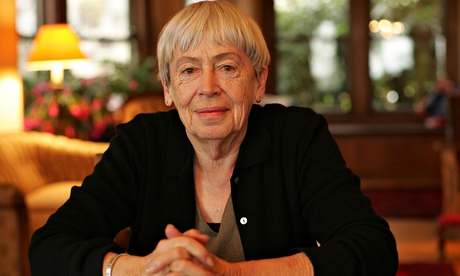
The National Book Foundation in America can lay claim to a staggeringly impressive list of past recipients of its Medal for Distinguished Contribution to American Letters: Saul Bellow, Philip Roth, Joan Didion, Toni Morrison, Ray Bradbury, John Updike. Stephen King, too, to a great deal of grumpiness from Harold Bloom back in 2003. On Wednesday, though, it announced 2014’s winner – and I think she may, possibly, be my favourite yet: the wonderful, the inimitable, Ursula K Le Guin.
“For more than 40 years, Le Guin has defied conventions of narrative, language, character, and genre, as well as transcended the boundaries between fantasy and realism, to forge new paths for literary fiction,” said the organisation, announcing its choice. “Among the nation’s most revered writers of science fiction and fantasy, Le Guin’s fully imagined worlds challenge readers to consider profound philosophical and existential questions about gender, race, the environment, and society. Her boldly experimental and critically acclaimed novels, short stories, and children’s books, written in elegant prose, are popular with millions of readers around the world.”
“She has shown how great writing will obliterate the antiquated – and never really valid – line between popular and literary art,” added Harold Augenbraum, the foundation’s executive director, very wisely. “Her influence will be felt for decades to come.”
Augenbraum says it better than I will, but I wholeheartedly agree. For me, Le Guin’s best books – the Earthsea ones, and The Left Hand of Darkness – are some of the very few titles which I would be confident enough to name as true classics, novels that will endure well beyond our lifetimes.
Her stories of Earthsea, and of Ged, the magician from the isle of Gont, were pillars of my childhood reading. Returning to them as an adult, discovering to my joy the existence of Tehanu, and The Other Wind, they were just as transporting. Phrases from the books are burned into my brain, I discovered, as I reread.
“He turned the boat around, working her carefully round with spell and with makeshift oar lest she knock up against the underwater rocks or be entangled in the outreaching roots and branches, till she faced outward again; and he was about to raise up a wind to take him back as he had come, when suddenly the words of the spell froze on his lips, and his heart went cold within him. He looked back over his shoulder. The shadow stood behind him in the boat.”
I think I had to stop reading A Wizard of Earthsea for a time as a child, the shadow scared me so much. It still does.
And what can I add about The Left Hand of Darkness that hasn’t already been said? A mind-bending sort of book, which I adored for how it made me re-assess my perspective on gender, but even more for its shiveringly brilliant depiction of the snowy journey of Genly and Estraven.
“Estraven stood there in harness beside me looking at that magnificent and unspeakable desolation. ‘I’m glad I have lived to see this,’ he said. I felt as he did. It is good to have an end to journey towards; but it is the journey that matters, in the end … Snowfields stretched down from the pass into the valleys of moraine. We stowed the wheels, uncapped the sledge-runners, put on our skis, and took off – down, north, onward, into that silent vastness of fire and ice that said in enormous letters of black and white DEATH, DEATH, written right across a continent. The sledge pulled like a feather, and we laughed with joy.”
I could go on – there are many, many lines from Le Guin which I think meet Claire Armitstead’s quest for a great sentence in genre fiction – although I tend towards Augenbraum’s way of looking at it, that “great writing will obliterate the antiquated – and never really valid – line between popular and literary art”.
Le Guin has received armloads of awards already – the National Book Foundation lists them, in its citation, and it takes the august organisation a while. This one, though – this is the biggie, and it couldn’t have gone to a more worthy recipient.

